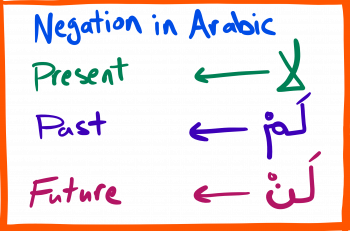Negating verbs in Arabic Posted by yasmine on Mar 6, 2019 in Arabic Language
Even if you’re a beginner in Arabic, negating verbs will come in handy for beginner’s conversations. It’s easy! ? There are three ways to negate verbs in Arabic depending on the tense. In this post, we’ll look at how to negate verbs in both MSA and in Levantine dialect for those of you who wish to also communicate with speakers from Palestine, Jordan, Syria, and Lebanon.
In English, if you want to negate a present tense verb such as “eating”, it becomes not eating. In the future, will not eat, in the past, did not eat, in the imperative, do not eat!
Arabic is similar in that we must add a word before the verb to negate it.
Present: In MSA, all you do is add لا before the verb.
Let’s start with the present tense. We’ll use the example “He is eating.” يأكُل
MSA: He is not eating. .لا يأكُل
Levantine: He is not eating. .ما عم بياكُل
Note: In Levantine ما is used to negate.
Note: If we were to say, “He does not eat meat.” We would do the same by adding لا .
.لا يأكُل اللحم
And in dialect: .ما بياكُل لحم
Past: Add لَم
MSA: He did not eat. .لم يأكُل
Levantine: He did not eat. .ما أَكَل
Future: Add لَن
MSA: He will not eat. .لَن يأكُل
Levantine: He will not eat. .ما راح ياكُل
Imperative: Also add لا
MSA: Do not eat! !لا تأكُل
Levantine: Do not eat! !لا تاكُل
How would you say the following in Arabic?
I will not go to work tomorrow.
Do not open the window!
She does not sleep early.
They did not know.
I hope you found this easy. Keep practicing! ?

Build vocabulary, practice pronunciation, and more with Transparent Language Online. Available anytime, anywhere, on any device.





Comments:
Saleem khan:
what is Laventine Arabic and what MSA?
yasmine:
@Saleem khan MarHaba Saleem!
MSA stands for “Modern Standard Arabic”, which is the formal/written Arabic you find in textbooks, news, speeches, etc used throughout the Arab world.
Levantine Arabic is the dialect spoken by people living in Syria, Lebanon, Palestine, and Jordan.
I hope this answers your question.
Shukran,
Yasmine
syed-Mohsin Naquvi:
Great work
Keep it up
yasmine:
@syed-Mohsin Naquvi Shukran! 🙂
I hope you found this useful.
Abdur Rahman:
Ma’am could you please make blogs that how to ask permission in Arabic with modal verbs like “may,might,can,could,will,would.
May I talk to you?
How to I say it in Arabic?
yasmine:
@Abdur Rahman Shukran Abdur Rahman for the suggestion!
I will write about making polite requests and asking permission in Arabic this coming week. 🙂
Stay tuned!
Rabia Vanker:
@Abdur Rahman Could you please give me the correct translation to the few sentences that you gave after the negation lesson .
I’ve worked it out but would like to check if I am correct.
Thanks for the valuable lessons.
Rabia Vanker:
@Rabia Vanker I’m sorry @ Abdur Rahman.. comment was directed to Yasmine
yasmine:
@Rabia Vanker !مرحباً رابية
So glad you considered doing the practice exercise! 😀
Here are the answers:
.لَن أذهب إلى العمل غداً
!لا تفتح النافِذة/الشُّباك
.هي لا تنام باكِراً
.لم يعرفوا
or
.لم يكونوا على عِلم
!شكراً
،سلام
ياسمين
Ameera Bousaid:
I remember when I visited Dubai couple of weeks ago, I did studied a little about their language. But, this is not necessary as people there can also speak english. Even to our chosen resort (Al Habtoor Polo Resort), people there greets us politely and can communicate well to travelers. Language was never a problem as long as you could express yourself. By the way, Al Habtoor doesn’t just offer comfort and great stay but also amenities like private pools and villas.